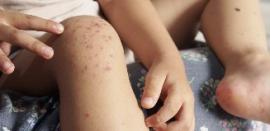
The Department of Health has called for calm following an outbreak of Hand, Foot, and Mouth Disease (HFMD) in KwaZulu-Natal, mostly around the Durban area.
In a statement on Tuesday, the department assured the public that it was working closely with the National Institute for Communicable Diseases, monitoring the situation while providing necessary support to the province to contain the spread.
HFMD is a fairly common viral infection, which mainly affects infants and children under the age of five.
“There is no need for the public to panic because the outbreak remains under control and at the current moment there is no serious public health threat detected. However, parents and caregivers are urged to be vigilant in case their children display common symptoms such as fever, sore throat, tiredness, loss of appetite and small blisters on the inside of the mouth, sides of the tongue, palms of the hands and soles of the feet,” it said.
The department explained that the infection is usually self-limiting and clears without medication after seven to 10 days. This means that one can recover without taking treatment or medication.
“Parents are urged to keep symptomatic children at home until they recover to prevent further spread of the disease.
“Hygiene practices are some of the most effective preventative and control methods to contain the spread of the disease, hence educators and parents are encouraged to promote good hygiene habits at homes and school environment including regular hand-washing, covering mouth when coughing, regularly cleaning surfaces and not sharing eating utensils and stationery.”
The department has been receiving numerous enquiries from the media and community members regarding the outbreak and possible health threat.
The disease is caused by a group of viruses known as enteroviruses, and it mainly occurs in small outbreaks at schools, crèches and day-care centres during the summer and autumn months.
HFMD spreads from person-to-person by direct contact or by droplets from the mouth or nose of an infected person. The virus may also be spread through contaminated objects (e.g. toys, stationery) and faeces. Children under the age of 10 years are at greatest risk of infection.
It is not common in adults, but people with weak immune systems may be prone to infection.
HFMD affects humans and it is completely different from foot-and-mouth disease, otherwise known as hoof-and-mouth disease which mainly affects farm animals like sheep and cattle. Thus, the two diseases are not related and are caused by different viruses.
“Although, HFMD is not part of the notifiable medical conditions, the department remains on high alert to monitor the number of cases in KZN and to detect outbreaks, if experienced, in other parts of the country,” the department said. – SAnews.gov.za


